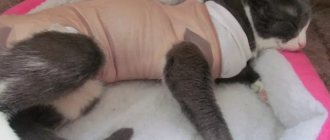It is absolutely normal for an uncastrated cat to mount a cat, since this is an instinct for procreation, which is caused by the action of hormones produced in its testes. And if this behavior occurs in free-range conditions next to non-sterile cats, it will not surprise us at all. However, when a neutered cat tries to mount a cat or even another cat living next to him, this behavior begins to cause concern for many owners. It upsets owners even more when a domestic neutered cat climbs astride the leg or arm of one of the owners and begins to make characteristic movements.
There are several reasons for this behavior
In most cats, this type of behavior stops after neutering. However, the behavior may not stop immediately after surgery. The wait can take weeks, and in some cases, months or even years.
After castration, there is a sharp decrease in testosterone levels, but testosterone, in some quantity, is still present in the cat’s blood, and how much there will be and how long it will remain in the body depends on each individual animal.
Even after castration, a cat may retain the habit of littering, especially if triggered by the smell of an unsterile cat. A neutered cat may even display mating behavior on neutered cats. Animal psychologist Nikolai Dodman suggested that this may have something to do with the fact that the female does not smell like the male.
Unneutered male cats can detect the scent of a cat in heat from a great distance. It is possible that a cat, even if she does not emit a cat odor while in heat, can emit enough of her everyday odor to provoke the cat to mount. That is, a cat can be provoked by the smell of even a neutered cat.
Cats neutered at an older age may be more likely to display this behavior, since they have already mounted cats or objects under the influence of hormones, they remember this behavior pattern and try to repeat it after castration, when hormones no longer affect them .
High levels of social stress can trigger the behavior of mounting cats or objects, just as it can trigger marking. If you let your neutered cat free range, he may encounter an unneutered cat, and the smell of her may be enough to trigger this behavior.
Some cats demonstrate mounting on pillows or toys, and awkward situations can occur when a cat lands on the arms or legs of a person, most often the owner. This behavior may indicate that the cat needs more attention and constructive ways to get rid of excess energy.
How to reduce unwanted behavior
Castration.
If the cat is not neutered, this is obviously the first step you should take. Don't make the mistake of thinking that you just need to keep your cat away from cats. This is not only about eliminating the risk of unwanted pregnancy in cats, but also about reducing stress and creating a favorable environment for psychologically healthy behavior.
Never punish
. Never punish your cat for this behavior because it will only increase the stress level. A cat who is trying to get out of social stress will feel even more anxious if he is physically or verbally punished. Undesirable behavior from punishment will only increase, to the point that it can develop into aggression.
Expand your vertical territory
. Increase your cat's sense of security by expanding his vertical territory.
This can be done with the help of cat complexes, beds on windows, hammocks and shelves on the wall.
Vertical territory allows cats to establish and maintain their status without resorting to aggression or other destructive methods such as cages. Being at a height is an important factor in a cat's status.
Provide an opportunity to sharpen claws.
The point of the claws for a cat is of great importance and serves different purposes, and one of them is to mark its own territory.
The point of the claws can help in maintaining the cat's high status. It also helps the cat relax to relieve stress. Availability of resources
.
Provide multiple resources in multiple locations to prevent competition and conflicts for the best resource. This means that you should provide cats (if there are several of them in the house) with more than one place to eat, more litter boxes than cats, and plenty of sleeping and hiding places to give the cats their own space. Carefully introduce new cats into the family
. Adding a new male cat can cause a variety of unwanted behaviors, including cages. To reduce the chances of this happening, ensure a gradual, positive introduction of the new cat into the family.
Increase the load
. Increase physical and mental activity to give your cats healthy outlets for energy. Participate in interactive play sessions at least twice a day for half an hour for mature cats and at least two hours a day for young cats (up to three years old).
Working to improve relationships
. In addition to the above, pay attention to the specific relationship dynamics between your cats so you can help them coexist peacefully.
Source: https://sestratk.livejournal.com/357016.html
Male behavior after intervention
If the castration operation was carried out according to all the rules, then the cat’s attraction will go away after some time. This usually takes 7-20 days. The duration of the period varies depending on the physiology of the cat and its individual characteristics.
If the cat had contact with females before the operation, then at first everything will be as before:
- he will look for females;
- will try to climb on them and trample them;
- may behave aggressively.
All this is the absolute norm. By the way, in veterinary practice there were cases when a castrato mated with a female, and she gave birth to offspring from him. Most often, this indicates that the operation was performed incorrectly.
A cat and a cat may live in the house, so information about whether a neutered cat can satisfy a cat becomes relevant. Some breeders, noticing that the cat still has the reproductive instinct, do nothing if there is a cat in the house that should not give birth. Sexual contact with a castrato will calm the female and will not harm her health in any way.
Review of the best products in the catnip category
If there are two or more males in the house, and one of them is not properly neutered, a he-she relationship can often develop.
A castrated cat climbed onto a cat, why does a castrated cat want a cat?
Most cat owners think that after their pet has undergone castration surgery, he will no longer show any sympathy for cats, but sometimes it turns out quite the opposite. So why did a neutered cat climb on a cat?
Almost all animal lovers (and not only) are filled with a feeling of tenderness and delight at the sight of little kittens.
However, not everyone, when purchasing a cat for themselves, wants it to continue its lineage, and also listen to their heart-rending screams at night. Also, do not forget the pungent odor that they emit during this period.
All these reasons push owners to reduce the natural sexual attraction to the opposite sex of their pet, including through surgery.
Very often, the owners of their pets, with the goal of completely dealing with the problem of reproduction of their pets, go for castration of the cat, but why does a neutered cat want a cat even after that? In order to understand this issue in more detail, you just need to understand the castration procedure itself and understand what it is.
Castration
The operation is carried out as follows: initially, small incisions are made in the area of the scrotum, after which special clamps are applied to the spermatic cords, and then the testes are removed.
As for cats, sterilization for them involves removal of the ovary; sometimes the uterus also has to be removed.
For cats it is much easier to perform this operation, since all the genital organs are external, which is why sutures are required only in rare cases.
Cats are castrated starting at 10 months of age. However, there are veterinary clinics that can provide their sterilization services starting at 8 months of age.
But in any case, castration must be carried out, without fail, before the first mating, otherwise the cat will reflexively want a cat.
This is due to the fact that animals that have already experienced the joy of a love affair with the opposite sex produce sex hormones not only in the genitals, but also in some parts of the brain. This is due to the pituitary gland, which, for obvious reasons, is not removed during the operation.
Features of the operation
This operation is common; many cat owners resort to it. After surgery, some changes cannot but occur in the animal’s body. But they are not dangerous to his health. And castration is of great importance, especially for domestic cats.
When a cat periodically tramples and gets excited, screaming loudly at night from his desire, this creates a tense atmosphere in the house. What should owners do in such a situation? As a result, no one brings such a cat a cat anyway, and peace in the family is disrupted for many days.
ATTENTION! The operation, if performed by a good veterinarian, is not dangerous, is carried out quickly, and the recovery time is not long.
The main thing is to properly prepare your pet for surgery and closely monitor it during the recovery period. Castration does no more harm than those hormonal and other pills that would have to be given to an overexcited animal.
The essence of the operation is that the doctor, after making small incisions near the scrotum, will completely remove the testicles or just tighten the seminal canals. Sterilization of cats is a more serious procedure that requires longer rehabilitation, because the cat’s entire uterus is removed.
After castration, the cat continues to “stomp”: reasons, what to do
All cat lovers know that it is advisable to castrate young cats, so as not to subsequently catch your pet, who has gone in search of girlfriends, in all the surrounding yards.
This operation is simple, the development of complications is unlikely.
Despite this, castration of a cat does not always lead to the results that owners expect from it: in particular, the animal may retain interest in the opposite sex...
General information
To understand why the castrato does not stop his love affairs, you need to imagine the meaning and essence of castration. Contrary to popular belief, it does not in all cases involve the physical removal of the testes (testicles).
The following types of castration exist:
- Surgical castration . The simplest, cheapest, and therefore the most common method. It involves surgical excision of the testes, i.e. complete removal of the gonads.
- Chemical sterilization . This method is not very popular in our country, but has a number of important advantages. In particular, these include the absence of the need for general anesthesia and the low traumatic nature of the operation. In fact, the whole procedure boils down to the introduction of sclerotizing agents into the thickness of the testes. These are substances due to which the testicle is completely replaced by connective tissue.
- Radiation castration . The name is scary, but there is no need to worry: the testes are irradiated with a directed beam of gamma radiation, after which their tissue completely dies. Fast, reliable, the likelihood of side effects is reduced to the minimum possible. No anesthesia is required, the cat only needs to be restrained. But the fixation must be reliable: if the radiation beam “processes” the insides of the cat, the consequences will be extremely sad. The method, however, cannot be considered cheap.
- Medical infertility . One of the most controversial methods. In this case, an implant is sewn under the animal’s skin, releasing medications (usually hormonal in origin) that suppress the pet’s libido. The testicles also remain intact. Moreover, after removal of the implant or due to the depletion of the supply of medications in it, after some time the cat’s sexual function is completely restored. The problem is that the constant effect of hormonal drugs on an animal’s body is extremely risky. Today, veterinarians believe that the risk of cancer and diseases of the endocrine glands increases significantly.
There is also a vasectomy . This procedure is a cross between full castration and medical infertility.
The essence of the method is to ligate the vas deferens, as a result of which sperm is not released during ejaculation, but all other features of the cat’s sexual behavior remain. That is, the animal will run after cats, fight with its relatives, etc.
Let us immediately note that in this case you should not be surprised by the characteristic “stomping”: in front of you is an absolutely “normal” cat, with fully preserved instincts and a set of sex hormones in the blood.
Let's start with, perhaps, the most common de-depletion technique. Let's assume that the cat's testes have been completely removed, which automatically means that there are no sources of sex hormones in his body. So why does your pet continue to behave as if nothing unusual had happened to him, and why does he feel excited when he sees cats?
The answer may lie in the peculiarities of his physique. Sex hormones (and not only) perfectly accumulate (that is, accumulate) in subcutaneous fatty tissue and other fatty deposits. Accordingly, when lipids are metabolized, some of the hormones return to the general bloodstream.
And contrary to the belief that neuters become immediately obese, in fact, in the first couple of weeks after surgery, your pet may well lose weight... as a result of which his body will receive a decent portion of sex hormones.
If the animal’s diet after castration was better balanced and the cat gets into shape, gradually getting rid of fat accumulations, hormones will constantly enter its blood.
But there is another option... What if your pet initially did not look like a ball, and began to show signs of sexual arousal again, a considerable time after the operation? Here the problem may lie in the biochemical characteristics of a particular organism.
Why does a pet get excited in the first place? From the action of sex hormones, which should not be in the blood of a castrate... hypothetically. There are animals in which testosterone begins to be partially produced in the adrenal glands . Its quantity is small, but the hormonal background is such that it is enough for arousal.
So what to do in this case? If, apart from an interest in cats, there are no other problems, you can leave everything as it is.
If in the spring the “inferior castrato” begins to annoy the owners with his screams and obscene pestering of their feet, you can use any medication intended for such purposes (“Sex Barrier”, “Cat Bayun”, etc.). The main thing is not to overdo it with them, since long-term use of such “sedatives” is fraught with the development of hormonal pathologies.
The cat gets excited after medical castration
In this case, everything is simpler, but also more complicated at the same time. What does it mean? The problem is that drug sterilization in 99% of cases does not completely suppress the production of sex hormones.
And although the manufacturers of these drugs say one thing, practice shows something completely different: in most cases, “medical castrates” continue to show a certain interest in cats.
It all depends on the characteristics of a particular organism and on the intensity of production of sex hormones.
But! We would strongly advise against doing this yourself. Hormones are a very serious matter.
If you use them at random, nothing good will happen to your pet. It is better to consult an experienced veterinarian. Let the specialist select the optimal remedy, which at the same time will not threaten the cat’s health.
So, why does your cat continue to “stomp” after other types of castration? Most likely, the factors are the same - either there are still sex hormones in his fatty tissue, or a small amount of testosterone is produced somewhere in your pet's body. Measures to eliminate this condition are the same as those we have already discussed above.
But! With chemical castration, other situations occur. If the sclerotizing drug was introduced and distributed unevenly within the tissues of the testis, part of the organ may remain in working condition. Simply put, the testicle (or both) will continue to secrete testosterone, as a result of which the cat will again begin to show interest in cats. Elimination of this cause is surgical castration.
Source: https://zveridoma.ru/posle-kastracii-kot-prodolzhaet-toptatsya-prichiny-chto-delat/
What to consider
- A cat should be neutered before it has the opportunity to mate with a cat.
- You need to think carefully about whether such an operation is really necessary, whether there will be a desire to get offspring from a cat of one breed or another.
- If you decide to undergo castration, it is important to carefully choose a clinic and a doctor. The operation is not complicated and common, but it is still a surgical intervention on the body. It should not be done at home.
- After the procedure, you need to help the cat cope with the condition . You need to be near him as much as possible, if only to calm him down.
- The result of castration may not appear immediately; you need to wait several weeks, sometimes more. Hormonal levels will gradually decrease, and sexual arousal will occur less and less often.
In some cats, sex hormones, testosterone, can be produced in small quantities by the adrenal glands. The amount is really small, but it is enough to excite. What to do in this case.
If the cat does not bother you too much, you can endure some periods. When your pet screams loudly or constantly pesters you, you should give him one of the sedatives specially designed for animals. For example, “Cat Bayun”, known to many cat lovers.
After castration, the cat continues to trample
That is, if this behavior is associated with the desire for sex, then there should be different behavior in cats and cats? But there is no suffering now - he is completely satisfied with what he already has and does not suffer from cats - he does not yell at night, he has “his own buzz” And I hope that this is mutual! From such a neutered cat, Busik’s parents later adopted him. Think about it. Study the experimental material here. There is a veterinarian near my parents’ house; her previous owner didn’t work there for long - she left.
From such a neutered cat, Busik’s parents later took him in. Think about it. That is, if this behavior is associated with the desire for sex, then there must be different behavior in cats and cats? And I hope it's mutual! It turned out that in more than half of the cases in those families where the cat lives without a cat, alone, like a pet, she did not castrate them, but simply gave them anesthesia and gave them to the owners.
Tell me what can be done in such a situation?
Razumova Elena Amateur Registered: This may seem funny from the outside, but we have no time for jokes, because we thought that castration would save him from suffering, but he continues to stomp around, that is, to do the same thing as before castration.
If everything doesn’t work out the way you would like, buy yourself a simpler construction set.
The cat was castrated at the end of August, it seemed like he forgot about everything vicious for a while, and then again he climbs on his wife and tramples her with his paws and claws, and then he also performs friction, so to speak, plus traces - a small speck of moisture.
Tell me what can be done in such a situation? And why is she?
Razumova Elena Amateur Registered: If everything doesn’t work out the way you would like, buy yourself a simpler construction set.
And I hope it's mutual! From such a neutered cat, Busik’s parents later took him in. Think about it. This may seem funny from the outside, but we have no time for jokes, because we thought that castration would save him from suffering, but he continues to stomp around, that is, to do the same thing as before castration.
Here, study the experimental material sooooooooooooooooooooooooooooooooooooooooooooooooooooooooooooooooooooooooooooooooooooooooooooooooooooooooooooooooooooooooooooooooooooooooooooooooooooooooooooooo muchs That is, if this behavior is associated with the desire for sex, then there should be different behavior in cats and cats?
But there is no suffering now - he is completely satisfied with what he has and is not tormented by cats.
It is naive to believe that his life as a man will come to naught completely. But there is no suffering now - he is completely satisfied with what he has and is not tormented by cats. From such a neutered cat, Busik’s parents later adopted him. Think about it
The cat was castrated at the end of August, it seemed like he forgot about everything vicious for a while, and then again he climbs on his wife and tramples her with his paws and claws, and then he also performs friction, so to speak, plus traces - a small speck of moisture. Tell me what can be done in such a situation? But there is no suffering now - he is completely satisfied with what he has and is not tormented by cats.
There is a veterinarian near my parents’ house; its previous owner did not work there for long - she left. Hmm, it’s strange, but our sterilized girl tramples in the same way. Tell me what can be done in such a situation?
If everything doesn’t work out the way you would like, buy yourself a simpler construction set. It was from such a neutered cat that Busik’s parents later adopted him. Think about it Razumova Elena Amateur Registered: Hmm, strange, but our sterilized girl tramples in the same way.
The cat was castrated at the end of August, it seemed like he forgot about everything vicious for a while, and then again he climbs on his wife and tramples her with his paws and claws, and then he also performs friction, so to speak, plus traces - a small speck of moisture.
It turned out that in more than half of the cases in those families where the cat lives without a cat, alone, like a pet, she did not castrate them, but simply gave them anesthesia and gave them to the owners.
Source: https://www.fabrikakarina.ru/posle-kastratsii-kot-prodolzhaet-toptatsya.php
Questions and answers about castration
Many cat owners are tormented by the question, “will castration harm their pet?” In this regard, veterinarians and simply cat lovers often hear various questions, some of which we will answer in this article.
Is it true that a neutered cat will no longer scratch, scream, fight, tear up wallpaper and furniture, etc.? Undesirable behavior of males is often associated precisely with the reproductive instinct, and not with any other.
Most people believe that the reproductive instinct should only be expressed in actions of a purely sexual nature, but in cats, as in people, repressed or unsatisfied sexuality can lead to various forms of destructive behavior.
Why is castration performed, at what age should a cat be castrated?
Castration is a fairly simple surgical operation during which the male gonads (testes) are removed.
The operation is performed on cats at the age of 9-12 months, after the completion of puberty. Until this age, furry pets do not have sexual instinct. Castration of a cat performed at an earlier age is fraught with serious consequences and complications. Until 8-9 months, the animal’s body is not fully formed. For example, a cat may have an underdeveloped urinary tract and inflammation often develops after castration. Any problems in the animal’s genitourinary tract will cause urethral obstruction, which can cause death.
Castration is carried out:
- to reduce the aggressiveness of cats;
- if a domestic cat constantly runs outside during the rut and fights with other males;
- for medical indications (scrotal injuries, congenital pathologies, orchitis);
- if the cat constantly yells, attracting cats, marks the territory (apartment, entrance).
The main purpose of castration, like sterilization, is to deprive animals of reproductive function and to correct behavior in cats that are too temperamental.
To reduce sexual desire, of course, you can use special medications and sedatives. But you need to take into account that such methods can harm the health of a mustachioed pet, for example, provoke hormonal imbalance. Therefore, the surgical method is more preferable.











